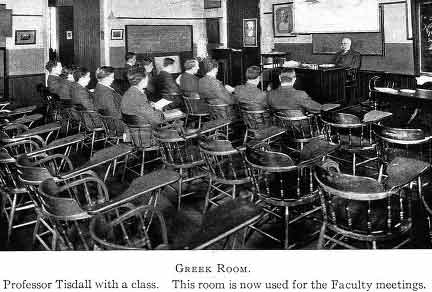|

The book:
The City College: memories of sixty years
edited for the Associate Alumni of the College of the City of New York
by Philip J. Mosenthal and Charles F. Horne
New York,: G. P. Putnam, 1907
P.263
Tutor Tisdall [...our dear Professor Tisdall, who seemed to know so much that
was profound and beyond our ken of Latin and Greek. p.248]
wore a certain aura of renown because our unwritten chronicles had it that he
could play several games of chess at once blindfold, and that he had met defeat
with honor in the lists of Ca´ssa at the hands of the invincible Paul Morphy.
The story continues ....
Fellow Morphy admirer,
DrKurtPhart
of chessgames.com, noted the above and
located some additional information previously uncovered Jeremy Spinrad in an
article called, When
Blindfold Chess Became Easy.
In the years 1861 to 1863, at least four New Yorkers you most likely have not
heard of before were giving simultaneous displays that would have been the
sensation of the world just a few years earlier.
The first of these blindfold players was a young man named Fitz Gerald Tisdall.
The Spirit of the Times chess column of September 10, 1859 notes
"the recent appearance in Brooklyn circles of a young gentleman named
Fitzgerald [sic] Tisdall, aged nineteen years, who learned the moves some ten or
twelve months since; but who now with both facility and celerity can conduct
four or five games simultaneously without sight of men or board: and that too
with a force scarcely exceeded by our most skillful players."
The column then gives the following game, which was part of a four-board
simultaneous blindfold exhibition. Tisdall lost to Perrin, but won all the other
games. Perrin was a strong local player, and would have been tough for anyone
other than Morphy even in a single blindfold game ....
Tisdall is one of those "failures" who gives up serious chess after a very
promising start. His obituary (New York Times, November 12, 1915) mentions his
role fighting on the side of law and order during the draft riots of 1863.
He became a Professor of Greek Language and Literature at the City College of
New York, where he taught for many years; there was a celebration of his fifty
years of service to the college on May 1, 1910. His name appears in the paper
from time to time, both for his academic work and his activities on behalf of
the Republican party. His name is not associated with chess in the newspaper
until his obituary, which talks of his fondness for the game and a simultaneous
exhibition he gave during "a great chess tournament held in the Academy of
Music."
|
Archives by Title
links
personal
The Life and Chess of Paul Morphy
chess - general
Chesslinks Worldwide
chess - history
Mark Week's History on the Web
Chess Journalists of America
Chess History Newsgroup
Hebrew Chess
Chess Tourn. & Match History
Super Tournaments of the Past
La grande storia degli scacchi
Bobby Fischer
Bil Wall's Chess Pages
|

